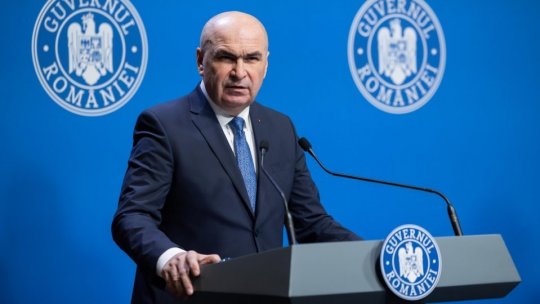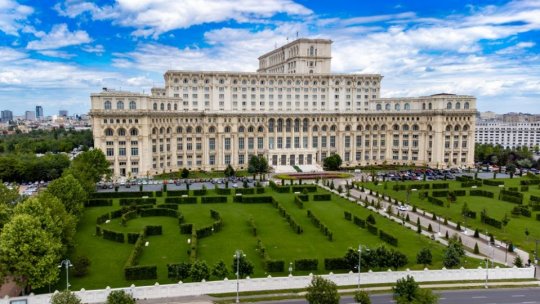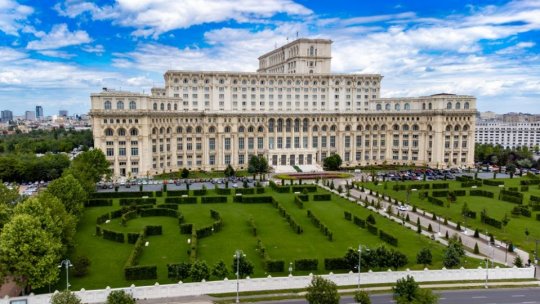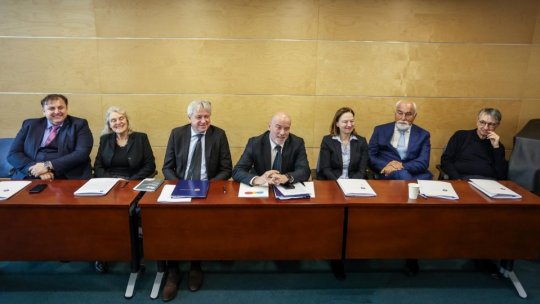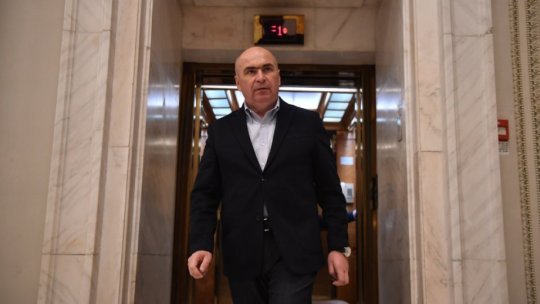Social Democratic Party president, nominated as Prime Minister
The President Traian Basescu said that he signed the decree appointing the Social Democratic Party (PSD) president Victor Ponta, as Prime Minister-designate.
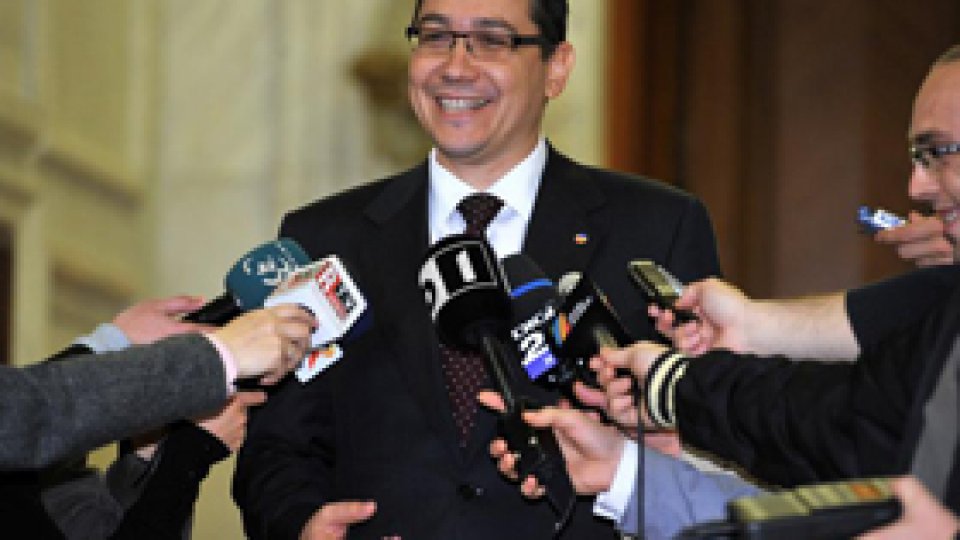
Articol de Ioana Dogaru, 29 Aprilie 2012, 10:31
The Social Democratic Party president, Victor Ponta, co-president of the Social Liberal Union (USL), was nominated Friday by the President Traian Basescu as candidate for prime minister.
The President Traian Basescu said that the only party that had an option for premiership was Social Democratic Party, proposal supported by the PC and National Liberal Party (PNL).
"There is only one name mentioned during the consultations and that is Victor Ponta," said Traian Basescu.
The president wanted to clarify that nothing dramatic happened for Romania.
"It was a democratic process that has proven that Ungureanu government no longer had parliamentary majority.
"The option for Mr Ponta was even more legitimate.”
"Currently there is no reason to panic, especially since it is known that Romania has at the Ministry of Finance a consistent backup." added the president.
Read here who is the assigned Prime Minister.
The president also said that he hopes what he asked in parliament about the return on wages from 2010 to occur timely.
"I hope that the new government which should begin very quickly to take into account this request," said Traian Basescu.
The designated Prime Minister, Victor Ponta, declared that it is a special moment "in our political life" and he accepts the mandate and tries to take it out.
"I rely on USL and all the parliamentarians who consider useful to support the government.”
"It is a time when the responsibility of every politician should work and I will try to form a government that can give Romanians the hope that things are going the way they should. I will soon present a list of the new government," said Victor Ponta after his appointment.
Consultations at Cotroceni Palace, after the motion was adopted
After the motion of censure "Stop the indebted government. Never like this" was adopted by parliament; President Traian Basescu called the parliamentary parties at Cotroceni Palace for consultations to appoint a prime minister designate to form a new majority and a new government.
The first who emerged from the negotiations with President Traian Basescu were Democratic Liberal Party (PDL) leaders.
PDL President Emil Boc announced the president at the Cotroceni meeting that Democratic Liberal Party does not designate a candidate for prime minister, and those who have a majority in parliament should assume the governance.
"I noticed today that the current coalition that supported Ungureanu executive no longer exists." said Emil Boc.
Emil Boc said that the Democratic Liberal Party (PDL), as the main government party which supported Ungureanu will not nominate a candidate for prime minister..
"Those who have the majority today are obliged to ensure the country's governing and do the utmost in the shortest time to increase budgetary salaries." says the Democratic Liberal Party (PDL) President out of consultations with President Basescu at Cotroceni Palace.
Emil Boc said that the new government must stop the "political instability" that generates economic instability, reminding the increase exchange rate Euro-Leu, fluctuations in the stock market and the IMF delegation's departure.
Victor Ponta, proposed by Social Liberal Union (USL) for prime minister- designate
After the LDP delegation, at the consultations with the Romanian President entered Social Liberal Union (USL) leaders who decided to go along.
Liberal leader Antonescu said the President Traian Basescu presented the proposal for Victor Ponta to be designated Prime Minister, and president took note of this.
"The parliamentary groups of Social Liberal Union (USL), namely Social Democratic Party(PSD), National Liberal Party (PNL) and Conservative Party(PC) consider that the political situation occurred after the fall of Ungureanu government by censure motion practically we no longer have a parliamentary majority, as it was so far placed, and the largest political group capable to constitute a majority and to support a government shall be our group." said Antonescu.
The National Liberal Party President also announced that Social Liberal Union (USL) proposed to President Traian Basescu that Victor Ponta should be invested with the mandate for prime minister.
Crin Antonescu said that the President Traian Basescu took note of this proposal.
Victor Ponta said in turn that the president has not previously proposed to take the leadership of the government, saying that only after consultations with the parliamentary parties announces who will be appointed to this position.
The President of the Social Democratic Party reiterated that the Social Liberal Union (USL) policy to support another govern other than the Democratic Liberal Party (PDL) made and added that the Union representatives will meet with IMF delegation in the coming period as they did every time.
Victor Ponta declared after the adoption of censure motion that the Social Liberal Union (USL) is open to negotiations with the Democratic Alliance of Hungarians in Romania (UDMR)and minorities, to form a government.
Social Democrat leader said that so far has no guarantee that the parliamentarians who voted today for the censure motion will have the same option for the USL government.
The censure motion was adopted
Consultations at Cotroceni Palace came after a censure motion against the Mihai Razvan Ungureanu government , made by Social Liberal Union (USL), and was adopted with 235 votes, four more than the necessary ones.
According to the official report shown in plenary by the Social Democratic Party deputy Georgian Pop, of 460 parliamentarians were present 259, 248 votes were expressed, four were cancelled.
The government led by Mihai Razvan Ungureanu was the executive with the shortest term, only 78 days.
The Ungureanu government was elected by the Parliament, after Prime Minister Emil Boc resigned.
Until the election by the Parliament of a new Prime Minister, the government led by Ungureanu ensures the interim.
Steps to follow to appoint a new prime minister
If the government is dismissed the nomination procedure starts for a candidate for prime minister.
For his nomination, the Romanian President must consult the party which has absolute majority in parliament or, if there is no such majority, the parties represented in the parliament.
The fundamental law also states that within 10 days after designation, the candidate for Prime Minister will ask parliament's vote of confidence on the program and complete list of the new executive.
It follows the debate in a joint session of the Chamber of Deputies and Senate and the confidence vote.
If the Parliament rejects the request twice the investiture of a new government within 60 days after the first request and after consultation with the presidents of the two chambers and parliamentary group leaders, the president can dissolve the parliament and trigger early elections.
But this provision cannot be applied in the last six months of the presidential mandate.
IMF breaks off negotiations with the Romanian authorities
International Monetary Fund, the European Commission and the World Bank review mission discontinue negotiations with the Romanian authorities, but technical discussions continue regarding the qualifying criteria and macroeconomic outlook, following to stay in the country for at least several days.
"Technical talks will continue, but negotiations will not . There are many discussions about targets for the first quarter, structural reforms, technical assistance and these can be continued, without having to negotiate anything," said for Mediafax the Romanian representative to IMF Mihai Tănăsescu.
Foreign exchange quotations went up to historically high level of 4.4010 lei / euro at one hour notice of the fall of Ungureanu government and the National Bank(BNR) intervened aggressively, indirectly, by selling Euros, and turned rate to 4.3900 lei / euro, reported Mediafax.
The record level of 4.4010 lei / euro was reached on interbank market in June 2010.
BNR ‘s intervention brought quotations between 4.3915 to 4.3950 lei / euro, in a market where, according to dealers, trading volumes are among the highest since the beginning of the year .
Some dealers say that the depreciation was subdued because of the international context, a relatively calm one.
Translated by Ioana Vioreanu
MTTLC, Bucharest University

